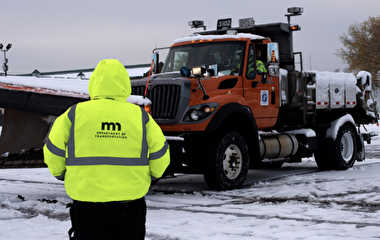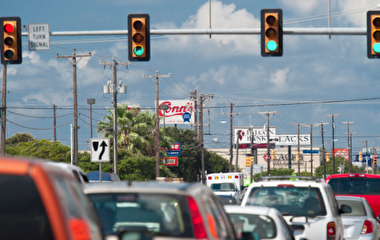The City of Ramsey is wearing down its roads faster than it can fund their maintenance and construction. In light of this, the city is investigating ways to fund road projects sustainably, and it partnered with the University of Minnesota’s Resilient Communities Project (RCP) to advance the investigation.
RCP, housed within the U’s Center for Urban and Regional Affairs, connects local government agencies with students and faculty to advance community resilience and student learning. The city was one of RCP’s community partners for the 2019–2020 school year.
Four students in a Humphrey School of Public Affairs course—PA 5041: Qualitative Methods for Policy Analysis—collaborated with Ramsey officials for the project. The course instructor was Greta Friedmann-Sánchez, a Humphrey School associate professor.
Ramsey city administrator Kurt Ulrich was the project lead. “Our city council was pleased to get the RCP study results detailing how Minnesota communities fund the repair and reconstruction of city streets. The information confirmed the importance of long-term stable funding for streets and played a critical role in the discussion of possible solutions,” Ulrich says.
For their project, the four students—David Ambuel, Sean Crawford, Steven Kutz, and Molly Sir—interviewed and surveyed city managers and public works professionals in the Minneapolis–Saint Paul metro. Their goal was to document the range and nature of sustainable road-funding mechanisms in suburban cities in the region. They then assessed which road-funding options would make the most sense for Ramsey.
They found that while general funds, supported by property tax levies and special assessments, were the most common funding techniques in their sample, franchise fees seem to be increasing in importance and popularity. (Using franchise fees, cities tax local utilities for their use of public roads to conduct their services. The fees, passed on to consumers, distribute the cost of road improvements across the community and allow residents to plan for a consistent monthly bill.)
The students also learned that some of the cities had updated their road-funding policies in the past decade. Key criteria such as equity, defined in numerous ways, led city leaders to make these decisions.
Their final report recommends the following steps for Ramsey to meet its future road construction needs:
- Increase community engagement: Establishing a robust and purposeful community engagement plan can help grow public support for new road-funding programs and help residents understand the current state of the city’s road-funding situation.
- Establish a new road-funding structure: Given the inadequacy of the current road-funding program in Ramsey, adding another funding tool to its toolbox—franchise fees—is recommended.
- Work in a coalition: Working together with comparable cities can help elevate the local road-funding issues to the state and present a strong rationale for the passage of additional tools for local governments.
The students faced the additional challenge of completing their work during a pandemic. “We scaled down the scope of our research because of the pandemic,” Ambuel says. “We could no longer conduct our interviews in person, and due to the added workload city officials were experiencing, many of the interviewees that we reached out to declined to participate in a timeframe that aligned with our deadlines. To adjust, our research team developed a pared-down survey from our interview protocol and expanded our recruitment efforts. These changes in our study design helped to supply valuable data and context to our report.”
A final report and presentation are available on the RCP website.



